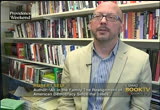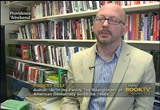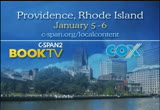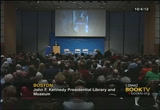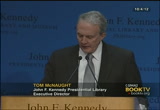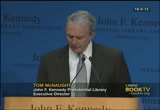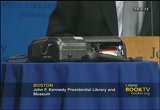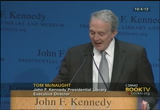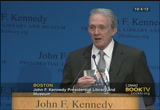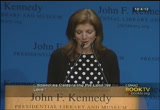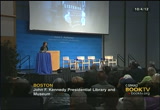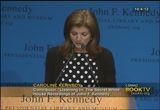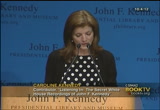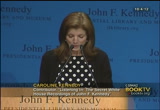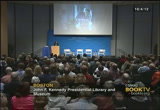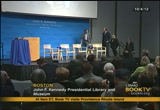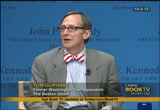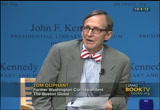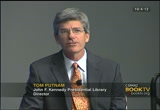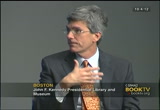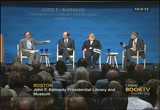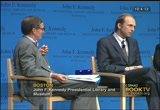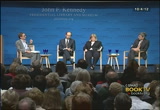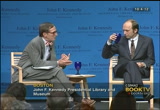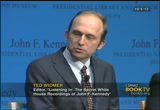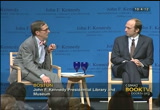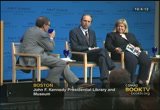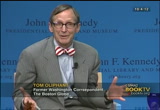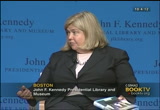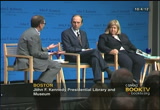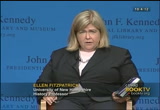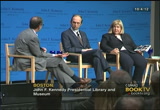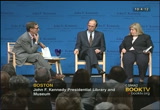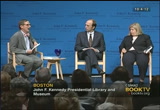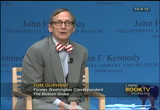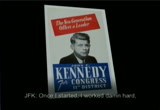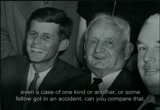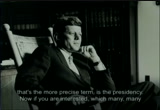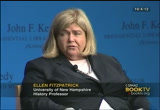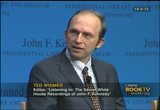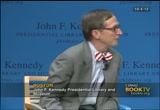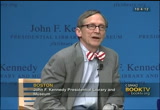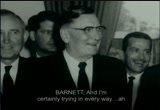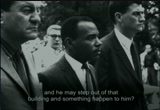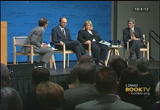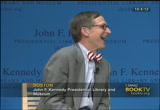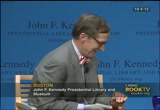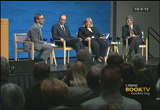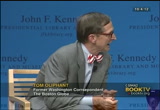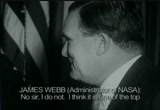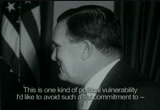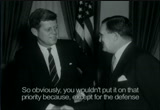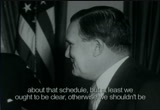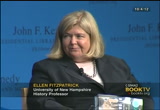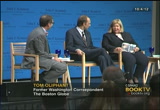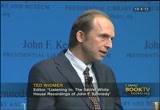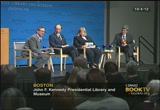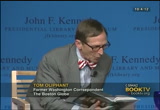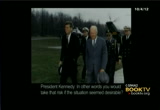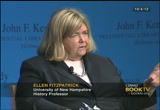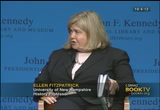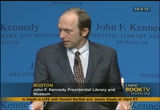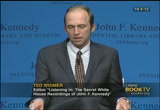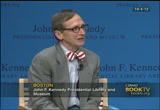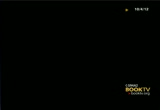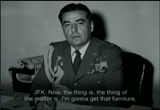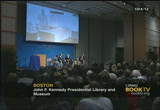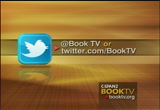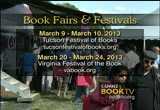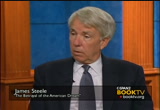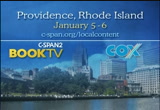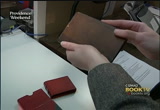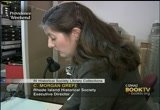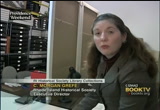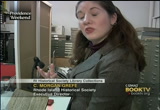tv Book TV CSPAN January 6, 2013 7:00am-8:15am EST
7:00 am
states. but studies since 2012 election of 2012, polling that's been done, especially with younger voters, revealed that the cultural war issues, over family, a virginia, over women's roles, over sexuality, that these have a less compelling grip on the younger generation. that they are not as moved by these questions. and so one does have to wonder whether this is something that will receive, or will continue to have in our politics these fights every two or three years. >> if there was one thing that i would urge viewers to take away, or readers to take away from the book, it's the way in which something as elemental to everyone's life as the first them and the way we organize ourselves in terms of families. but this can actually be a really critical -- understand much dear at broader turmoil so
7:01 am
if we use them as a kind of historical lands and focus on the period from the 1960s to the present, the last half a century or so, that can tell us a lot about how we as a country move from a relatively liberal political heir to a much more conservative political air. whether that is changing, we're in a shadow of the 2012 election, we don't know yet. i think it's still too early to tell. but certainly the last generation or two of american politics has been dominated by a more conservative orientation of the whole political culture. and i think using the family, something that we are all familiar with and comfortable with as a lens to really tell us a lot about that transformation. >> for more information on booktv's recent visit to providence, rhode island, and the many other cities visited by our local content vehicles, go to c-span.org/localcontent.
7:02 am
>> next on booktv, caroline kennedy, daughter of former president john f. kennedy, presents a panel discussion on the collection of recordings of the late president in conversation from the oval office and cabinet room in july 1962. the tapes include discussions on numerous topics of the day, including the cuban missile crisis and vietnam. this is about an hour. >> good evening, ladies and gentlemen. i'm the executive director of the john f. kennedy library foundation and on behalf of my colleagues, the director of the john f. kennedy presidential library and museum, and all of our library foundation collects, i thank you all for coming this evening. let me begin by acknowledging the generous underwriters of the kennedy library forum. lee sponsor, bank of america, raytheon, boston capital, global institute, the boston
7:03 am
foundation, and our media partners, "the boston globe" and wbe are. tonight's forum is a very special one for those who work at the john f. kennedy presidential library and museum. tonight's forum is a testimony to the hard work and dedication of government employees who work so hard to preserve the records of our nation's history, and in particular, those of president kennedy. the publication of listening in, -- "listening in: the secret white house recordings of john f. kennedy," which is now on sale in our museum store, would simply not been possible were it not for the incredible skills and talent and professionalism and dedication of our library staff. again, government employees. there is one person in particular that tom putnam and i would like to acknowledge, and that is more that is maura porter, an archivist has been overseeing the declassification of these white house recordings for the last 11 years, and he knows more about these 265 hours
7:04 am
of president kennedy's taped conversations than any other american. so i ask that you please join us in thanking and acknowledge in mauro's work and that of all her colleagues here at the kennedy library. [applause] >> we have a wonderful panel with us tonight. joining us for tonight's discussion is presidential historian ted widmer whoso carefully selected the most compelling and important of these remarkable recordings, and then he wrote beautifully detailed annotations of the transcripts placing them in historical context for the reader and listener. with this also is presidential historian ellen fitzpatrick, a professor of history at the university of new hampshire. also a wonderful and frequent contributor to our kennedy library forum. my colleague and friend, tom putnam, the kennedy library's outstanding director to bring
7:05 am
such energy to the library's mission of preserving our nation's history, and our good friend who we always love having with this, pulitzer prize-winning journalist tom oliphant who will serve as tonight's moderator. but tonight's featured speaker is really president kennedy, who in july 1962 installed hidden recording systems in both the oval office and cabinet room so he might have a record of deliberations and exchanges during his administration. the president also used a dictaphone to record his personal observations following key meetings and events. we thought you'd all enjoy seeing the actual dictaphone that he used at senator before becoming president. we put it up there on the stage. we invite you to, look at it after the forum, but this is the real thing. this is what the president used when he was in the senate, the one he used when he was president instead of the national archives. over the years we've welcomed many individuals to the stage
7:06 am
have worked for president kennedy. those who wrote for him, those who served with him in the navy, those in him as a friend. they'll have their own take, their own interpretation of what happened during those years, their own spin. now it is the turn of president kennedy, our principal speaker tonight, the police that we invite you to listen to will be that of president kennedy. many of this year the library see this new book as the one president kennedy never had the opportunity to write. and it is now my great pleasure to introduce the individual who is most responsible for its writing and publication. it was caroline kennedy who first conceived the idea of a book that presented some of the most compelling and fascinating excerpts of these secret white house recordings. it was caroline who championed its publication. and i can personally attest that every word, every caption, every photograph in "listening in" had caroline's i for both detail and accuracy. and i'm sure ted widmer will
7:07 am
speak to that as well. caroline kennedy as you is the author and editor of nine best selling books, on american history, politics and poetry. actually you could make that 10 best selling books. we just learned today that "listening in" is on "the new york times" 10 best selling list. [applause] >> caroline as you know serves as the president of the kennedy library foundation which provides the financial support for this library for some of these programs that the government could not otherwise support. and that airlines request, all proceeds in revenues from the sale of this book will go to the kennedy library to support its program. so have i mentioned that this book is now on sale in our museum? [laughter] and caroline has graciously agreed to remain behind this for him to sign the book. it's now my great pleasure to welcome to the stage caroline kennedy. [applause]
7:08 am
>> hi, everybody. thank you. thank you so much. you are so nice. welcome to all of you. it's wonderful to have you here at the kennedy library. it means a great deal to me that 50 years after my father's presidency, so many people still share his ideals and his vision for america. to me, his greatest legacy are the people that he inspired to enter public service. almost everyday someone tells me that they ran for office, got involved in their dignity, joined the peace corps, volunteered in the inner city or in outer space, because he asked them to give back to this country that's given us all so much. the generation he inspired has passed that commitment on to their children and grandchildr
7:09 am
grandchildren, in carnegie a spirit that continues to work for a more just and peaceful world. as we approach the 50th anniversary, my family and the kennedy library of a good deal about how to best celebrate and honor my father service and patriotism. we recognized that his time is becoming part of history, not living memory, and that brings opportunities as well as challenges. both my parents loved history, and they pass that onto me and my brother, john. my father read voraciously about the civil war, english parliamentary history, and the world wars of the 20th century. my mother preferred the ancient world and 18th century europe. for them, the past was not a dry, dull affair, full of exciting people, brave heroes and heroines, and events that could teach us a great deal about our own time. here at the library we decided to concentrate on making the
7:10 am
history of the kennedy administration accessible to the widest possible audience. in the hope that the treasures of the kennedy library will inspire people growing up today in the same with the stories of the past inspired my parents. on the 50th anniversary of my father's inauguration in january 2011, we launched the digital archives, putting all the president's papers, correspondence, memos, photographs and film on line so the people around the world could have access to this material. not just scholars who could come to boston. we created the president death, and interactive school so students could click and learn about an expensive most important moment in the presidency. we translated my father's majors addresses into more than 40 languages available online. this project was the culmination of 10 years of digitizing, meta- tagging, and private sector partnerships which have made this library first to truly
7:11 am
first digital presidential library. but last fall we released my mother's oral history, seven conversations with the story arthur legislature which it concealed here at the library since 1964. and now to commemorate the 50th anniversary of the cuban missile crisis, we are publishing a book called "listening in: the secret white house recordings of john f. kennedy." president kennedy take 265 hours of meetings, phone conversations and privacy between july 1962 when the taping system was installed in november 1963. you will. you would've more about this from our panel is, but the taping system was top secret. it seemed the only people who knew for certain of its existence where my path, his secretary, and the secret service agents who installed it. that is until president nixon made the idea of white house taping famous and infamous. [laughter] and other presidential recording
7:12 am
systems were revealed to against the backdrop of watergate, the concept of secret taping can seem problematic, but it is beyond doubt this is a unique and invaluable historical resource. on these tapes history unfolds in real time in the most dramatic possible way. we had the chance conversations of the civil rights movement, and a life or death decisions be made during the cuban missile crisis. people often ask me why my father installed the system it as a lover of history i know he would've been drawn to this new technology as a way of keeping an accurate record of events for the memoir he planned to write after leaving office. and after the bay of pigs disaster, people say he wanted to be able to remember who said what in case they later changed their tune. [laughter] the wonderful thing about this book is that although much of this material has been available, it has not been easily accessible until now. the original recordings are of varying quality and it isn't
7:13 am
always clear who is speaking in meetings. working with maura, our outstanding archivist and her colleagues here at the libra, historian ted widmer did an incredible job of selecting highlights from the most significant crises as well as excerpts to show the range and complexity of issues facing the president. as a citizen in an election season, i find it passing to listen to my father talk about what kind of person succeed in politics. he believes the times were changing and he was right for the time. it's interesting to apply his standards to the current campaign. he talks about the odds of people with money succeed in politics and about what are the factors come into play. applying a standard to today's rage, i know where i come down. i encourage you to make up your own mind. as his child i cherish the parts of my brother and i think here on the tapes. i remember walking into the office before school in the
7:14 am
morning, and visiting in the afternoon so we could play under his desk. it was the highlight of the day for john and me, and they delight in my father's voice shows that he felt the same way. i feel fortunate to be able to listen in on his meetings, to be able to hear his mind at work, his tone of voice, his chuckle, his frustration. and most of all, his sense of purpose. what comes through with this conviction, the politics is a way of solving problems. and that nothing is more rewarding than getting part of one place to serving our country. i hope the listeners will be inspired by the states to answer his call, thank you. [applause] -- by these tapes to answer his call. >> how you all doing? there you go. i'm tom oliphant, and boy, have we got a treat for you.
7:15 am
[applause] i know caroline kennedy says all the time, because it's true, talks about the impact that president kennedy has had on so many lies, your moderator included, but there was just one thing i wanted to add, and that is we are so fascinated both in what he said and what he did that it almost seems as if his words have relevance today. and i have an example in my hand, direct from these tapes that shows you how many gyms that are in them. it's a meeting with general douglas mcarthur, by then retired, in the oval office in august of 1962. and here is president kennedy in
7:16 am
1962 speaking to us today. do you know this fellow, romney? [laughter] what do you know about romney? have you met him? still asking this question all these years later. [laughter] we have a tough job up here tonight, because time presses in on us. and i will do my best to be the kind of aggressive moderator you may not have seen on television. [laughter] [applause] >> we are going to introduce this fascinating collection of more than 245 hours of tapes, plus about what, 17 hours of dictaphone and telephone conversation. and then were going to play
7:17 am
some, and i'm going to introduce four or five tapes briefly, and then, we're not going to have time to discuss them in depth but i'll make sure there's at least some discussion after each tape. so with that, let's get started. and putnam, tell us, set the scene, how long has the library then in possession of these? how did this happen? and what was done -- describe the process that was done to prepare them for the public's use. >> let me violate your -- i want to quickly thank caroline kennedy for all of the initiatives that she describes that makes the institution the cutting edge it is we could knew that her leadership and support. and also my colleague, executive director, really was the manager of the entire project and the book that we're all enjoying today. wouldn't be possible without all the work you did. so, well, right after the
7:18 am
assassination of -- the taping system was dismantled, and the president and secretary moved over to the executive office building and the tapes went to a variety of locations and vigilant ended up here at the kennedy library. and caroline indicated their existence was known by a few people before 1973, robert kennedy actually used them for his book, 13 days -- >> were they all stored in one place? >> primarily. it's kind of a long involved story but yes. and again, there's two different types of tapes. the reel to reel and the dictaphone. so in 1973 that is publicly acknowledged that we have the tapes. the kennedy family actually listen to them in 1976. 1983 was when i had the first opening. it was a curious fact that the system was installed in 1962 in the year 2012, we opened and
7:19 am
declassified the very last tapes to it took us 50 years but that the entire collection is open and declassified. this book that ted worked on is the first book to include all of the tapes spent and if one of these fine people wanted to go browsing, where would they go? and how are they organized speak with even more exciting as caroline indicated, all of them have been digitized and are on a website. people can go to our website, go to our digital archive and search them. then on the education portion of our website, for instance, we have a whole website where they come to life. you can also come to research room, not all of them are yet on the tapes. some people still come to research room. specs of the word accessible does come to mind. >> yes, absolutely. and now can't you should really appreciate what this guy, anybody who has ever had to work with research material, above all, tape-recording of office conversations of any kind, maybe
7:20 am
have some appreciation of what horrible drudgery it is to go through this. so on behalf of history, ted, thank you very much, for all you did. but i want you to explain something more about the system. particularly the way it was set up in the cabinet room, the oval office, at least, at least one telephone. describe it. there was a switch in the knee part of the resolute of the desk, and -- >> like com, i also want to ignore your question briefly to give my thanks to this great library for what it did to make the writing possible, and the library could not have been more supportive at every level, beginning with caroline's phone call and the constant support of tom mcknight and tom putnam.
7:21 am
but then all of the library, maura was essential at every tough moment, but all the staff, mary rose and bill and lori and steve and karen in the library. it's a great team working here. and no historian can do this kind of work without the preliminary work the library does for the pics are very grateful to all of them. to get back to the system, caroline mentioned the desk, as you do, and she mentioned playing in the desk. and it was exactly in the knee hole, the space underneath the desk that one microphone was close to our chief sources, oral history by secret service agent, robert, 1970 7a while later described where he had put the mic, and that's pretty much our only source. >> if i could interrupt, that agent had a particular specialty in the secret service.
7:22 am
that makes his choice of this assignment interesting. >> his job was to protect president kenny from electronic surveillance, so he was trying -- [laughter] -- the outside world from listening in, but he was asked to help president kennedy listen in on its own conversation. >> so it was 22 years before 1984. >> so one mic was in a hole of the famous desk. another mic was over on a coffee filter in the cabinet room not far from the oval office there were some traits, and he put a couple microphones in the drapes. and in his oral history he mentioned he put microphones in the residence, but they're so indication indicates everything out of the residence. >> so far. >> right. >> the other question that just naturally occurs is, is it impossible to find any documentary record of the decision to do this? or things that preceded doing
7:23 am
it, some discussion preceded it? do you know anything about what produced this that is hard invest? >> i don't know of any documentary evidence. the only evidence is the oral history which is pretty interesting. he speculates it was weird to the cold war. and evelyn lincoln once speculated also that the bay of pigs in particular but i wonder in the introduction if that's true because a year -- it was 1962, not 61 that the tape system went in. and without knowing exactly i think he would've been ready to write a memoir. he was well into his presidency and he often joked about his memoir. he would say i'm going to put this in my memoirs. and so i think this was the idea of a historian gateway to write the history. >> do you put much credence in the idea that after the bay of pigs, and, of course, during it,
7:24 am
we know in much detail that a great deal of what the president was told about especially before it happened, it had not turned out to be particularly inaccurate, and that he didn't want this as a check on -- >> i think that's an added bonus. i still think the historian reason rings true for me most clearly. but he was getting a lot of advice about military operatio operations, the bay of pigs had awakened him to this problem. and cuba was heating up already. even a few months before the crisis there were tremors and it turned out to be highly -- to the taping system in place because we have a nearly perfect record of all the conversations around the cuban missile crisis, a record of extraordinary value for historians, and those conversations include conversations i his top military advisers after he left the room in which they are pretty critical of him.
7:25 am
we included a section of that -- >> pretty foul mouth about it, too, actually. >> shockingly. >> final question before i get to the professors interpretation on a couple of central point, then we'll hear some videotape. the president had to make a conscious decision to flip the switch in the desk, and in the cabinet room and on the phones, and, obviously, for dictaphone. having absorbed all of this, can you find or discern any pattern to his switch flipping? >> well, as a historian who appreciates the high quality of these conversations, i think he knew when an important moment was coming and would press the button. it was a push button. when he was expecting an important phone call or an
7:26 am
eating. but having said that i don't know the recordings that were not made. but the ones were made were of very high quality meetings. >> and yet we're going to listen to a couple of recordings, including one great one at the end about the most deliciously heady of things. so we are left without much guidance as to how he used to. >> we are. >> okay, professor. tell me one -- >> scott brown i'm afraid -- [laughter] >> it's not an insult i hope. >> there's a great story there. the last one to do this, and he did it successfully of course with pat moynihan in new york, and he ran against william f. buckley's brother, jim, right? and at their first debate, berkeley turns to him and starts, it comes right out of his mouth, professor moynihan. and moynihan looks up at with a
7:27 am
big spot that says, oh, the mudslinging begins. [laughter] here it's -- >> thank you. >> tell us, generalized for us, historians have not typically have access to anything resembling this kind of material with the exception of some nixon and whatever. how are we to regard this a source of information? what is it? >> well -- >> do you have to check it? is a good the way it is? >> i think it is good to go. i mean, we have, with wonderful about these tapes are the immediacy of them got at also we certainly, we do have other presidential tapes to listen to. one of the things that i actually love about these tapes are the conversations between
7:28 am
president kennedy and his brother, and when you listen to the nixon tapes, they have a certain quality. then you listen to the to kennedy brothers talking about how mean this guy is come it sounds -- to hear mean as opposed to some of what we heard on the nixon tapes. i'm sure there were other words used to describe problematic figures, but it's really, it brings you back to a different moment in time. >> what about, is it possible to get some insight about maybe fresh insight, about how a president actually works? in other words, have access to his behavior in the oval office, his give-and-take. often at the moment of decision, right? how does that add to the record?
7:29 am
>> i think it flushes it out but it certainly does that, but i think what is more powerful about the tapes, at least from my point of view, is the way that it brings president kennedy to life in a way that's on stage. he was masterful in his use of television. he had a lot -- he was her first television president so we have a lot of media about him. but there's something about this, one of the things i find very moving about the book is the way in which the portrait of kennedy that emerges from these tapes is so consistent with the portrait that has been drawn over many years of him, as someone who was thoughtful, funny, aggressive, warm. we could go on a whole list of adjectives, but i think it gives
7:30 am
a kind of, there's a veracity to it that's very powerful. and i think we will be very helpful for students who are trying to learn about kennedy and what he was like as president. >> did you find his mastery of detail unusual for president like typical for president? how did he handle subject matter? i mean, this stuff in the book, it's all over the lot, you should know. and so you get to see him, or hear him, and a number of settings. i'll make a statement in little of the question. he seems extraordinarily in control of the most detailed aspects of policy. was that unusual for the time? he was extremely well-informed. he had a very searching intellect. some presidents are marketed in this way than others.
7:31 am
so we say. yes, you know, it's a range of issues that he was dealing with. i think his ability to sort of sort through all of the dimensions of the problem. i mean, on specific issues one of the things that emerges is how -- about military intervention. and really, you know, really trying to find a moderate way through. and that was true on civil rights. it was true on many issues. so i think a more specific issues you see the substance of the way his mind worked. >> indeed. any disagreement, ted, before we go to the takes? >> i agree completely, but with civil rights, a great story is told in the year and foremost, not too much time that the tapes capture of trying to find a moderate path in the middle of
7:32 am
1962, to take an aggressive path of civil rights was actually difficult politically and very unpopular with the majority of voters. and finding a very courageous path forward in total alliance with the leaders of the -- >> civil rights seems, see if you agree on -- it seems to be the one area where in his conversation he is acutely aware -- like johnson was later -- that there's out so they now political gain in this at all. >> right. and yet he is doing it anyway. he did the right thing. >> he took his time and we've had discussions right here in this room about decisions about civil rights in the campaign in 1960 or early in the administration, and then it starts to move. >> set up the first paper to your question. you have a presidency at the center. and famously he didn't have a chief of staff. he didn't have -- he wanted to
7:33 am
have information flow directly to him. you here that indicates. >> so, like, here we go. we have one, two, three, four, five, six takes. one of which is almost fall down funny. the first was recorded by common consent of the participants. it's all little dinner, just 30 days after he declared his candidacy in the caucus room of the united states senate. and its kennedy, mrs. kennedy, then bradley and his wife, whom would all call tony, and bradley who was washington bureau chief of "newsweek" at the time right along one of his reporters basically who later became a public official of more than a little consequence, jim cannon,
7:34 am
7:37 am
>> ellen, one of the things that sometimes has been said about president can is that he could be almost dispassionately analytical in talking about himself. what comes through to you? this is right as the presidential campaign is beginning, and it's almost like he's a third party looking at it. >> yes, but what really struck me about this dinner party conversation was how much he enjoyed all attacks, his passion for it. and this is true in the tapes in the oval office as well. the delights he took in political life comes through very powerfully. and his conception of the presidency, he was out so the right when he said in a 19th century, the president didn't do much. they were involved in terrorists in the slavery issue, which was crucial, but by the time he
7:38 am
sought the presidency, it was increasingly seen as a kind of master institution to american political life. >> gotcha. feel free -- >> i love the dinner party to. i felt so lucky to hit the first time. it was only given to this libra i believe in 2007, five years ago. we are still gathering the material to study this presidency. and it only became available for publishing and 2011, so it was hot off the presses. so it's so honest. you are all good friends just talking about why do you do it? and it's full of ambition. that is for sure but it's also full of a lot of -- i wouldn't say self doubt, but self-knowledge. he very interesting talks about how he -- his grandfather, they mislead would stand up on a table and sing sweet line,
7:39 am
whether asked or not. and loved going to fenway park. >> the only element i can think to add is this, zest for being in the center of national life, for its own in transit merits, quite apart from any purpose but i'm in my article, i think it is oliver wendell holmes, at one point or another i've heard come out of the mouths of many i kennedy, i think it's a person is involved in the action and passion of, at the peril of being judged, not to have lived. and this guy has a zest for life that is palpable. now he is president. he has won the election, and one of the first crises of course is the desegregation of southern university, university of alabama initially. this is from what was going on
7:40 am
50 years ago almost to the day. i was just upstairs skyping with a forum at old miss, which is marking the 50th anniversary of their rough week. if you've ever been to the civil rights museum in memphis, tennessee, they have these recordings, but this is the president talking with one of the principal faces of segregation at the time, governor ross barnett. the safety of james meredith, the student in question gives him some guy. someone has been killed at this point in the right that is unfolding on the campus. and they are doing an elaborate dance where president kennedy is nonetheless insisting that a couple of things have to happen, and here's is how it unfolds.
7:43 am
[laughter] >> what was president kennedy seeking to accomplish? and can you explain this ballet speak back there's so much having adam glad we got to be. you can hear a lot in the tone that you can't always get from reading the transcripts. and in that very important conversation he is asserting the right of the president of the united states to order the governor of mississippi and to restore order in a perilous situation, meredith is in danger of his life. parenthood, james meredith has been inspired to register for the university of mississippi when he heard president
7:44 am
kennedy's inaugural address. so there's so much history in the air before playing the tape, tom leaned over and said i wish we could hear the chicken. the previous phone call, they're still talking about civil rights but their politician. governor barnett, at the end of a pretty intense call, said thank you for which it of our poultry program the president today, he stifles a laugh because he can't believe that this blowhard has just mentioned the poultry program. in the conversation we heard, they're not being polite anymore. they are not dancing around. they're going right into the. and the president is saying you have to do this. >> i should add a story. you know, in the south at that time governor barnett was sort of known as a bit of a dim bulb. [laughter] and two years before, during the presidential campaign, one of the flashpoints in the debates
7:45 am
that fall involved to nationalist chinese islands just off the coast of china. and right after this argument erupted in the campaign, ross barnett was out politicking one day, and a reporter asked him, governor, what about the islan islands? and he looked around, sort of lost and said to one of his aides, is that them those two files i put on the fish and game commission? [laughter] but if you hear the tape, when barnett brings up the poultry program, you can sort of your president kennedy half laugh. spin don't go out there making speeches and they talk to me first, they had to deal with ross barnett, the kennedy
7:46 am
brothers, that is elaborate team by which they would have meredith registered in jackson, and then we've got ross barnett at the football game that very day standing up and giving a speech about, that was really falling coming in, we're going to resist the tyranny of the federal government. and he's invoking civil war vintage theories of nullification and interposition spinning he seems to like fold like a cheap suit on the telephone. [laughter] >> but he didn't really fold, and that's what led the president to send in federal troops and national guard spent apropos that, one of my favorite stories my favorite stores the president can come his my favorite stores the president can come his supposed essay to an equally bad segregation, the mayor of jackson, mississippi, i don't care if you denounce me in
7:47 am
public. just don't you dare do it in private. [laughter] spent robert carey at one point tells barnett, i've taped the conversation. he said these -- spent exactly spewing it is an exhibit at the civil rights museum, and it is a delight watching people listening to governor barnett, at least not that he can no longer do any harm. the next tape involves a subject that may be a little arcane, the state's program, but it's offer to show a little bit about what a real president sounds like. this is president kennedy meeting in 1962, i believe, in the fall, a year and a half after he made the announcement in the state of the union speech of the goal to get to the moon
7:48 am
7:52 am
>> ellen, is it really that hard or even a strong president to move this mountain called the government? >> apparently so. i think we can conclude. i think it's wonderful to see him really get his point across, that there was no way he would be one of the great scientific experiments, and, obviously, his science advisors were interested in all of the different intellectual dimensions of it. he had a very clinical spent i think, that are three stars. he is leaving, no doubt about that, but his to advisors are talking back to them come and
7:53 am
that is not easy to do in an oval office. >> which you like. >> and i give them credit hiring brave enough people to talk back to them. it's good conversation among smart people. and the book also gives transcripts of the conversation a year later with the same people in which these smart people have almost reversed position. easy saying, is this too dangerous? should we think more -- the science advisors are saying we're going to spin off so much amazing technology. we're going to define the ninth \60{l1}s{l0}\'60{l1}s{l0} -- 1960s by what we're doing. >> i also love the change in mr. webb a year later as the president is based of asking him, is this the top priority? absolutely, sir. >> i think he also asked whether it can be done on demand. is there a way of doing this? and perhaps part of the shift
7:54 am
comes from a kind of lessening of kennedy's own cold war -- >> part of what i want to understand better, this meeting is taking place, if i can do the math, about a year and a half after the speech, the state of the union speech. and here is a year and a half later, and the government isn't really on board. and you think, my god, how can that happen? >> on again off again employees at the u.s. government, i can confirm that is often the case. but there is a written document i've seen on display in this library that has him writing more or less the same language what are we doing? why isn't it being done right now? what can we do in the next 24 hours? he really was on it. but i think it's worth pointing out that in 1963, with a very different your politically from 1962, the cold war had called down a big notch after the cuban
7:55 am
missile crisis and christians and kennedy were working pretty closely together to keep it that way. and he proposed the russians and the americans have a joint lunar landing. the russians did not accept that. it's very interesting to know he proposed that. >> just quickly to bring another part of the statement to life, i want to invite able to confirm using. we have the technology they were debating about, but there's a wonderful new exhibit at help everyone will see it. >> gets so little. amazing. >> the cuban missile crisis, in an audio sense almost completely documented, right? what we have for you now is a short tape. on october 22, 1962, president kennedy made the famous speech to the country where we heard for the first time something about what was happening. on that day before he made his
7:56 am
speech, as he often did, as presidents often do, he got on the phone to predecessors. and one of them was president eisenhower. and first, it's interesting to hear the mechanics of this kind of a call to a predecessor, ma but because of something that they talk about right at the beginning, i want to ask ellen about it after the tape is played. i'm going to read a paragraph and then we will be okay. this is the president. general, what if the soviet union, khrushchev, announces tomorrow which i think he will that if we attack cuba, that is going to be nuclear war? and what is your judgment as to the chances they will fire these things off if we invade cuba? eisenhower, oh, i don't believe they will.
7:57 am
a point not elaborate on. and ellen, what i wanted to ask you, when you hear tapes and read transcripts from the missile crisis, one of the things that fascinates me is the extent to which berlin was on president kennedy's mind almost hourly. talk about that a little bit. and how could somebody like -- here we go. >> if we attack you become it's going to be nuclear war. and what is your judgment as to the chances they will fire these things off if we invade cuba?
7:58 am
>> ellen, talk a little bit about this, 50 years later, people have forgotten a little bit as to how important considerations about berlin and our allies were throughout the missile crisis. >> yeah, it's clear, there's a wonderful transcript in the book in which president kennedy himself sort of gives an overview of what he thinks is at stake in the missile, the deployment of these missiles in cuba.
7:59 am
and the concern was that if we were to attack and try to take, to have a strike against these, that the soviet union would then feel emboldened to take over berlin. and berlin had been very much, what was really the issue, most of greatest concern of president kennedy, and he felt that the soviet union would have felt that they were justified in doing so, that they couldn't have a western presence with missiles pointed so close to them. if we couldn't tolerate it in our neck of the woods, they wouldn't tolerate it in theirs. so, throughout the crisis, i mean, one thing i would recommend is that people not read this before you go to bed in a casual discussions about nuclear -- nuclear war and they keep you up. we lived through it and made it, but it's very sobering. that's the backdrop and it's --
8:00 am
>> just elaborate a little bit more, doesn't this help us understand that there were people, we always knew about adlai stevenson. until this i hadn't realized the former defense secretary robert lovett under harry truman, george bundy, the president's national security advisor thought that berlin was so important that that was why they urged him not to attack or do airstrikes, because of the concern. it wasn't about appeasement. it was a concern about what would happen in berlin. ..
8:01 am
>> to defend cuba during a long, sustained campaign if the united states invaded. however, it's now known -- what was not known at the time -- that the russians, while there were many more of them, there were about 40,000 russian troops in cuba, not 8,000 as estimated -- >> and there were actual warheads. >> they had the short-range nuclear weapons that would have wiped out an american invading army on the beaches. and about 100,000 men had been gather inside florida, and a lot of those men -- we might have had the total number of deaths of the vietnam war in the '50s, thousands, in a couple days of an invasion of cuba. and then a nuclear exchange following that in europe and around the world. so thank god president kennedy was thinking those three or four steps ahead of everyone else. >> not always his military people. my favorite transcript for years has been the meeting with the joint chiefs of staff where
8:02 am
general curtis lemay, we say bombs away with curtis lemay, makes a tasteless crack at the end of a meeting about the situation, and in effect, mr. president, you're really in a terrible fix here. and you aerokennedy say -- you hear kennedy say, what did you say? and lemay stupidly repeats it, you're really in a terrible fix here. [laughter] and kennedy says in case you haven't noticed, you're in it with me. [laughter] now we have to wind up the treat, and i apologize in advance that we're is so near the end, but it's not all nuclear war and taxes and whatever. near otis air force base from which the family often traveled back here from the cape, trying to anticipate a first family's need, of course, is what staff members and military aides have
8:03 am
been doing for thousands of years in all sorts -- somebody had a special room equipped at otis air force base, i believe, in case mrs. kennedy were to go into labor while they were in, on the cape. somehow or another somebody let a picture be taken of this room and the furniture in it that appeared in the paper. not a good idea, um, if it's a paper that the president's going to see, which he did. and this is the resulting conversation with one of his military aides.
8:05 am
[laughter] >> when some -- the next time somebody asks me what leadership is -- [laughter] >> but, tom, we should tell quickly the follow-up story. thfl in the new york -- this was in "the new york times" last weekend, and sure enough the gentleman pictured, bill, is still alive and living in new mexico. he wrote to "the new york times", and the interesting
8:06 am
thing was he never heard how angry the president was, so this is his five minutes of fame. perhaps not quite how he imagined it. >> he's lucky, because there was discussion of having him moved to alaska, transferred to alaska. [laughter] >> can we bring that sill hi bastard -- [laughter] >> one of the things that i hate most about this duty is having to call a halt to the proceedings. but i have to. um, and i hope we've given you enough to realize that both the book and the cds inside are gold mines. please enjoy them, and thank you very much for coming. [applause] >> we'd like to hear from you. tweet us your feedback, twitter.com/booktv. >> here's a look at some upcoming book fairs and festivals happening around the
8:07 am
country. the 31st annual key west literary seminar is in florida from january 10th to the 20th. this year's seminars focus on biographies of writers from the two centuries. february 14th through the 17th is the savannah book festival from georgia. evan thomas, isabelle will can kerrson, dave barry and many more will speak. watch booktv for live coverage. then during the second week of march, booktv will be live from the tucson festival of books in arizona. among several authors featured with timothy egan and kristin iverson. also in march the virginia festival of the book begins on wednesday, the 20th, and runs through sunday, march 4th. this -- march 24th. this annual event features douglas brinkley and congressman john lewis. please let us know about book fairs and festivals in your
8:08 am
area, and we'll add them to our list. post them to our wall at facebook.com/booktv. or e-mail us at booktv@c-span.org. >> you don't always find many newspaper editors in any era embracing investigative reporting. the point we've seen over the years it's not just economics, it's the discomfort that investigative reporting up causes in a newsroom -- often causes in a newsroom because it was troublesome. it's that more than the economics. if you're going to ruffle the feathers of somebody powerful, that gets those people running in to crane to the publisher, and the stories are legion over the years about those kinds of things happening. don and i were really fortunate all through the '70s and almost all our career to work for people who were really strong and upright in that area and just let the chips fall where they may. >> the pulitzer prize-investigating team of
8:09 am
donald barlettennessee, and james steele are the co-authors of eight books. their latest, "the betrayal of the american dream." watch live today at noon eastern on booktv on c-span2. >> as one of the first cities established in the united states, providence, rhode island, has a nearly 400-year history integral to the development of the country. as the site of the first bloodshed of the revolution to economical devastation during the great depression and eventual recovery through the investment of public funds. providence is rich in literary and historical sources and materials. for more information on booktv's recent visit to providence, rhode island, and the many other cities visited by our local content vehicles, go to c-span.org/localcontent. >> my name is c. morgan grefe, and i'm executive director of
8:10 am
the rhode island historical society. and right now we're here up in the stacks of the rhode island historical society library on the east side of providence. today we have an asourcement of -- assortment of books from our collection. the first two books that i want to start with today are actually related to roger williams, probably the most famous founder of rhode island. there were more than one for the colony of rhode island, so roncher williams gets the most attention, and these books are some of the reasons why. the first book we're going to look at today is called "the key into the language of america." and it was published in 1643. it's an original binding, so it is kept in this case. this book is 1643, and it is the first-ever dictionary of an indian language in english. this is an original printing printed by gregory dexter, so
8:11 am
these are london imprints. these were not printed in the colony of rhode island. but this became an amazingly important book not just in the 17th century where it does show, in fact, roger williams' claim on the land that becomes rhode island. it shows his relationship and the closeness with which he has worked with the native peoples of rhode island such as the narragansett. but it also is used through the 17th, 18th, 9th and into the 20th century as one of the only dictionaries and keys to the language of algonquin-speaking people. so it really is an amazing work that retained its significance well into the 20th century. this book was incredibly well known and well used, and it wasn't a book of much controversy. unlike his next book, which we're going to be looking at, which was just one year later published in 1644 without his name or the name of the printer, gregory dexter, on this book. and this book is in a new binding, so we can handle it a
8:12 am
bit more gingerly. and it was the famous "bloody ten innocent of persecution." he is showing why he is different and why his thinking is different and why rhode island will be different from massachusetts and the other colonies to the north. he was creating a land where people could come, could worship as they chose and would always be protected by the civil law. roger williams, while he was a member of
8:13 am
>> washed and made white in the blood of the lamb, it's a response by cotton. it comes just a couple years later, and a few years after that roger williams replies to him, and then cotton replies again. so over the span of about ten years you see the back-and-forth battle of words as these men discuss the philosophical ideas that then become really n many ways, roger williams' founding of the first amendment of the united states. it is here where we see that separation of church and state articulated and argued over the course of a decade. arguably, one of the most
8:14 am
important things roger williams does bring to this colony that differentiates it from the others that are formed is this true idea of liberty of conscious. historians have argued through the 20th century that this has not just an effect on the first amendment, on the declaration, on the constitution, but even an effect on the economy of rhode island and how it developed, because it welcomed immigrants and migrants from all over the colonies and all over the world saying to them we don't care where you're from, we don't care what you worship. you will be welcomed here to do work and be protected by the law. and this meant that people came here who were open to speculating in ideas and speculating in businesses. in fact, one man, john hammett, leaves the baptist faith and becomes a quaker. in 1727 he publishes this small volume as a response. "vindication and relation." and it's
133 Views
IN COLLECTIONS
CSPAN2 Television Archive
Television Archive  Television Archive News Search Service
Television Archive News Search Service 
Uploaded by TV Archive on

 Live Music Archive
Live Music Archive Librivox Free Audio
Librivox Free Audio Metropolitan Museum
Metropolitan Museum Cleveland Museum of Art
Cleveland Museum of Art Internet Arcade
Internet Arcade Console Living Room
Console Living Room Books to Borrow
Books to Borrow Open Library
Open Library TV News
TV News Understanding 9/11
Understanding 9/11